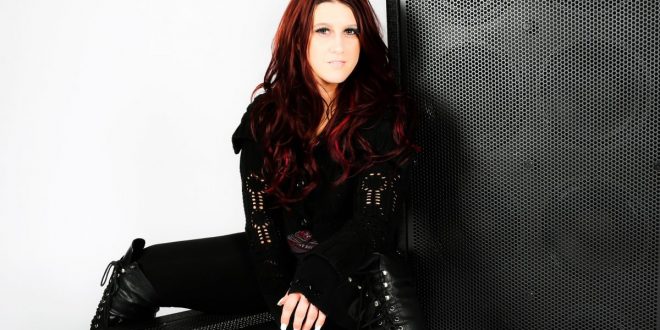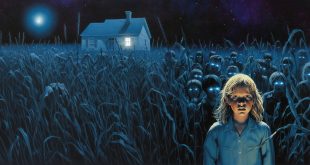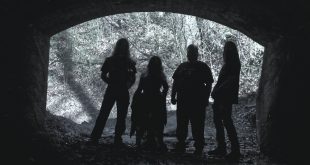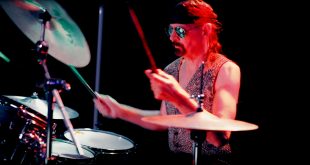In the mid-to-late 90s, Jasmine Cain became a regular performer in the bar scene of Sturgis, South Dakota. By 2003, her move to Nashville, Tennessee would prove essential in catalyzing her career. She’d form the Jasmine Cain Band, who would craft an identity of equal parts country, blues, and alternative rock, and release their debut album, The Inside, one year later. A trio at present, Cain serving as lead singer/bassist, Jordan Roepke as guitarist, and Philip Kelly as drummer, the band stands strong with six albums of heavy-hitting and award-winning material under their belt. Their seventh and latest album, simply titled Seven, is led by the single “Be Brave.”
I caught up with Jasmine, who was on her way to a photoshoot at the time, to discuss her vast experience as a performer, the genesis of her new album, Seven, as well as what she can gather about her current success.
Given your history playing live, how do you like it these days?
I love it! I was born to play live (laughs); I’ve done it since I was a kid. I was six years old in my first bar band, so I’ve been playing my whole life. I’ve also been around bikers my whole life since Sturgis is home to the world’s largest motorcycle rally. I’d say it comes pretty naturally.
To get a better idea of how you perform, I watched a clip of you covering “Me and Bobby McGee” at the Broken Spoke Saloon. Just before that, though, you made a great speech about how much it sucks to feel like giving up, and how important your fans are in giving you hope. That must have come from the heart. Was that something you did spontaneously?
Yeah, I think that was based on whatever I was feeling at the moment. The basis of it was remembering that even though it looks like it’s impossible, you have to keep following your dreams. The only people who lose are the ones who quit, but once you keep at it, you’re going to get there; you’re going to win! It’s so easy to look at a situation and know how frustrating it is. This is a difficult business! You’re not really making any money, you know? And you compare yourself to your friends, who are working their 9-to-5 jobs, getting promoted, buying new cars and new houses, starting families, and you’re just sitting there with your guitar, trying to figure out what the hell you’re doing with your life. But one of my favorite things to say is you’re not competing with anyone; you’re simply working to become a better version of yourself. As long as you’re even slightly better than you were yesterday, then there you go – you’ve improved!
Ultimately, you just keep rockin’.
Yeah! And I loved that night at the Broken Spoke. I assume it’s the one with the giant swing, and there’s this girl sitting next to me, Laura. I needed her help because I didn’t have a microphone holder, and she was like “I’ll do it; I’ll sit with you” (laughs)! We had such a great time, and that place was just full of magic. I haven’t been there in many years, and I think that show might have been one of my last ones there, so I’ve missed it so much.
Let’s go back further, to when you were growing up. What was your environment like?
I grew up in a cattle ranch outside of Sturgis. In those days, there wasn’t a whole lot of interaction with other people. You’d wake up early in the morning, milk the cows, feed the horses, and just take care of chores. At school, I didn’t really talk to anybody or have a lot of friends. It was very odd – very isolated. In wintertime, there are really cold and long winters in South Dakota, and there’s nothing to do, so you pick a hobby – something you’d want to learn – and I thought of learning an instrument. My older brother bought a guitar, and it was super fun watching him learn how to play. I ended up getting a chord chart for $1.95 – since we didn’t have YouTube tutorials back then – and taught myself guitar that way. I’d also listened to the radio to try and hear what the chords I’m playing might be, so I guess that’s how I learned to play by ear, and how to play on time.
So, my brothers and I picked up instruments and formed a little family band; it was a country band. It was funny, too, because there weren’t a lot of people in our area who were playing music. If you had even some talent at all, the people around you would be so crazed about it, like, “Oh, that’s so great,” you know? There was a lot of positive encouragement throughout the neighborhood and our community. As far as playing live, we played little municipal bars. We weren’t really any good, but my brother always told me, “If you can’t play good, play cheap and loud” (laughs)! And like I said before, there wasn’t much in the way of entertainment out there, so we were pretty well-received.
It was that encouragement that got me excited and wanting to continue on because I’d never gotten that kind of attention for anything else I’d done in my life. I was also a crazy athlete and had earned tons of scholarships and sports awards, but there wasn’t that much encouragement – it was quite the opposite. The people who were training us were always rough and would instill a kind of Debbie Downer mindset into us. Naturally, I’d gravitated much more toward music, because that was the only thing I felt I’d gotten any genuinely positive reinforcement from.
At that point, I felt like I could learn any song on guitar if I wanted to and could really improve my playing if I worked hard enough at it, and I did. It wasn’t until I threw myself out from the big fish in the small pond to the small fish in the big pond that I really started getting the authentic, constructive criticism. But by then, I felt accomplished enough that I could handle it. I learned a bit of everything from everybody, and I’d try to get better because of it. Nowadays, my brothers no longer perform; they kind of gave it up after I left home. So, with my leaving home, that was the end of our country band, and the end of their future in music, really.
It must have felt bittersweet. On one hand, your band broke up, but on the other, you were striving to make that change.
Well, we were all happy, and I think it worked out for the best. By that time, my older brother had gotten married and started a family immediately after. The difference was that my brothers saw music as a fun hobby, while they’d also worked different jobs. But for me, I was the only one who saw music as my career.
I can understand that. When you mention initially being an athlete, I get a sense that the feedback you received made you numb after a while, but music is different, because it’s not only something you can improve upon at any level, and something you sincerely enjoy doing.
Yeah! Not to mention the sheer joy it brings people. I mean, who doesn’t want to be that person who has the power to make everyone happy?
I totally feel you on that. I was thinking back on the time you released your first album, The Inside, which was 2004, and that was the start of your crafting an identity all your own. What was the indie experience like for you, especially during that time?
When I was starting out, I didn’t have a lot of people on my team, so I made the move to Nashville where I knew absolutely no one. But once I started to meet people, I got very, very lucky. I met one girl named Paige Randall, who was a writer for Pure Music. I felt a strong connection with her and we immediately started writing songs together. We became great songwriting partners. Paige is one of those people who can write something amazing with anyone, and I’ve never experienced that kind of connection before, so I was really excited to meet her. She remains one of my closest friends, and we still write together on every record.
It’s interesting. Back then, I didn’t have a sound, an image, or really know who I wanted to be, so I had to create that from scratch. I had this stylist friend of mine named Perry Spence, and she kind of helped me from going off the deep end. Naturally, when you’re young, you just want to be hot, wild and crazy, and do your album cover in a bikini (laughs)! But she advised me to make it respectful and meaningful so that I could look back at the album when I’m well into my years and be proud of it. That was about longevity, and I’d never thought about things like that because all that mattered at that time was what was going on at the moment.
I needed the right people in my life, and I feel lucky that they gravitated toward me, and kept me grounded and focused. What’s so funny about this record is that Paige and I, like I’d said, are still writing great music together, and I think these are the best songs we’ve ever written. As we speak, I’m driving to meet up with Perry Spence, who did all the photos for the first record, and who is now married (laughs). We’re about to do a photoshoot after all these years – 15 years later. By staying grounded, it’s allowed us to keep those friendships that we wouldn’t otherwise think to maintain if we were living in the here and now.
Businesswise, the internet was still fairly new, if you could imagine. All the ways we have now in terms of sharing music wouldn’t exist for several more years. You’d put something out there, and it wouldn’t do much unless a label was all over it and got people excited about it. Most of the time, you were just forgotten about, and off you go. Nowadays, you have a whole host of platforms to push your music onto. If you wanted, you could release something to the masses just from YouTube, where loads of people can hear it the day it’s uploaded. That’s crazy; it never happened like that back then! You had to know somebody, or your dad had a bunch of money he was paying people off with. There was very little hope for people like me, coming from nothing (laughs). I honestly don’t know what kind of crazy thoughts I had back then, thinking I could accomplish something major; it just wasn’t happening then. But I guess there was something inside of me that told me things were about to change, and I was going to get my chance, you know? And I’m getting it right now!
Yeah, and now you’re on Seven, which is your seventh album! How did that come about?
Well, as we’ve talked about, everything is constantly changing. One thing I notice that’s changing is the presence of physical formats. Compact discs are still here, but at the same time, they’re kind of going away. So, in a way, I felt like this album would conclude my run of physical sales. Seven is a number that represents completion, and I feel like I’ve completed seven pretty amazing works of art. But this will be the last physical release, and I’m just going to go digital from here on out.
I listened to the first single, “Be Brave,” and then went back to the first album for comparison. It really does represent a full-circle approach, since it returns to the heavy, raw sound of your early days.
Yeah, it represents that completion. Now we’ve come full-circle, but at the same time, we’d never strayed away from what we were. I think we’re better songwriters now than we had been, and we’re also different people altogether, but you’ll hear the same characteristics in “Be Brave” as you did with “Give Me Love,” you know, that angst, and…
That crunch!
Yeah! And it’s one of those thought-provoking, meaningful songs that we’ve always done. I think it’s awesome that you compared the two, because it’s interesting to hear someone else’s take on where it started versus where it is – whether we stayed consistent, grew, or changed entirely.
As far as production, technology has obviously evolved. Did you intentionally revisit the same tools and gear you’d used on the first album, or was it different this time around?
It was actually a different approach. This is the first time I’ve worked with a producer to give the music more of a pop feel. I’m a big fan of Caleb Sherman’s work, and he and his soon-to-be wife, Monique, put out stuff with their band, HER, that’s day-and-night different from what I do. But I loved what they were doing on those records, and I’d asked them to work with me on this one, and they were thrilled. I wanted their funky New York style to complement my dirtied-up, country, rock n’ roll sound. We ended up working on a lot of the songs together and took them to a whole new level that I wasn’t expecting but am super excited about. I mean, we decided that we all need to be songwriting partners for the rest of our lives (laughs).
It’s interesting how you were going for more of a pop production, but you didn’t have to sacrifice what you’re known for in the process.
Yeah, and what’s cool about that is I knew I didn’t want to stray too far from what my fans are familiar with and expect from me, but at the same time, we were still able to bring a different flavor to the table. With Caleb, he’s so used to doing his productions a certain way, and it’s his unique style that caught my attention, but I was also looking forward to that balance – meeting somewhere halfway in between what we normally do, and what he normally does. Going too far in one direction wouldn’t accomplish the goal. It would just be another HER record, and we wouldn’t be involved at all, and we wouldn’t want that, so that’s why we went with having a little bit of both sounds.
That’s what makes it a true collaboration, after all.
For sure, and they have songwriting input on this album as well. I don’t write songs like they do, and they have a definite formula for it. Our collaboration, I felt, was awesome because it was so out of left field, and we were free to experiment with everything – whether it’s playing random parts or singing random words. But because I’m a songwriter, I had to go back and say, “Hey, we have to fine-tune these parts,” or “These lyrics don’t make sense; we have to make them cohesive.” It was a bit of my bringing them in, and their taking me out of my comfort zone. It was great for both of us.
With seven albums to your name, and all that you’ve been through up to this point, what have you learned?
When I started out, I was known under two names – Kelli Heidler, and my stage name, Jasmine Cain. I came up with Jasmine Cain to create a persona and an identity I felt comfortable in. Normally, I didn’t feel comfortable around people when I’d be on stage. I’m not a fashionista, or just good at being a girl. There’s nothing about me that’s related to that. I felt like Jasmine Cain was all the way over on one side, and the real me was on another. Seven records later, the two sides could not be more similar. They’ve truly come together, and I finally feel complete as one person.
It could take seven albums, or it could take just two, but ultimately, you’ve accepted yourself.
Right, and I want to look back these as a whole and feel proud of it – every bit of it; the notes, the artwork, and everything we’ve accomplished. I want to put it on my wall and say, “I did that on my own, I’m proud of that, and I deserve that.”
Lastly, anything you’d like to say to your fans?
My fans are the greatest people out there. I’ve gotten to know many of them personally, learning about their stories and battles with life in general. I’ve also realized how important my role in this world is, and that you can choose how to proceed in life. You can choose to be an asshole and mean to everybody, and maybe they’ll learn something from that. Or, maybe you’d crush them, and they’d learn to be tougher. You could write songs that are empty and meaningless, but maybe that makes them feel good because they know that they don’t have to think about anything today. But the thing is, I’ve learned that it’s important for me, with the voice that I have, for the time that I have it, to say things that are important both to me and my fans. My fans are my friends; they’re not just fans. I love them all, and their stories matter. I wouldn’t know how to survive without them.
Jasmine Cain Socials:
 Music Existence Because of Music, We Exist
Music Existence Because of Music, We Exist




